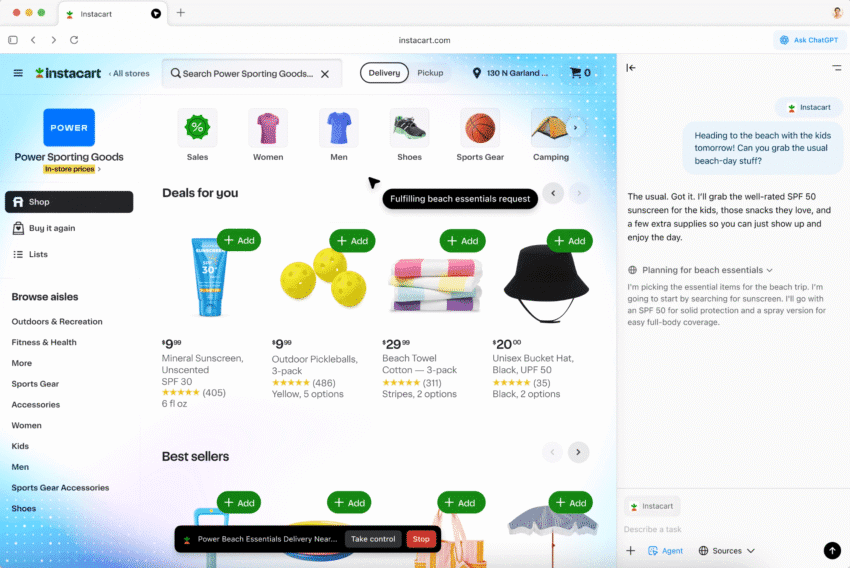
openai s ai-powered browser chatgpt atlas is OpenAI has officially launched its AI-powered web browser, ChatGPT Atlas, marking a significant step in its ongoing competition with Google.
openai s ai-powered browser chatgpt atlas is
Introduction to ChatGPT Atlas
OpenAI’s latest offering, ChatGPT Atlas, was unveiled during a livestream event, following a teaser that showcased browser tabs on a white screen earlier that day. The browser is now available globally for macOS users, with plans to extend access to Windows, iOS, and Android platforms in the near future. However, the innovative “agent mode” feature is currently restricted to ChatGPT Plus and Pro users, as confirmed by OpenAI CEO Sam Altman during the livestream.
Features and Functionality
Personalization and Memory
One of the standout features of ChatGPT Atlas is its memory capability, designed to enhance user experience by making the browser more personalized and helpful. According to Adam Fry, the product lead for ChatGPT Search, this memory function allows the browser to remember user preferences and past interactions, making it easier to tailor responses and suggestions. Users can manage their memories through the settings, ensuring they have control over what the browser retains.
Agent Mode
The agent mode is a significant advancement in OpenAI’s approach to agentic AI. This mode allows ChatGPT to perform actions on behalf of users, such as booking reservations, purchasing flights, or even editing documents. This functionality builds on previous efforts by OpenAI, including the Operator tool and ChatGPT Agent, which aimed to automate more complex tasks. While these earlier versions had varying degrees of success, the introduction of agent mode in Atlas represents a more refined approach to task automation.
Split-Screen Interface
When users click on a link from a search result in Atlas, the browser defaults to a split-screen view. This feature displays the webpage alongside a ChatGPT transcript, creating a “companion” experience that is intended to enhance user interaction. Users have the option to disable the split-screen if they prefer a more traditional browsing experience. This dual-display setup aims to provide users with immediate assistance and context while they navigate the web.
Cursor Chat and Summarization Features
Another innovative feature demonstrated during the livestream is “cursor chat.” This functionality allows users to select text from an email or webpage and click a button to have ChatGPT refine or edit the text in real-time. This feature aims to streamline the editing process, making it easier for users to produce polished content without leaving the page they are working on. Additionally, the browser includes summarization capabilities, enabling users to quickly digest information from lengthy articles or documents.
Market Context and Competition
The launch of ChatGPT Atlas comes at a time when AI-powered browsers are gaining traction in the tech landscape. OpenAI’s entry into this space follows the introduction of several other AI-driven solutions, including Perplexity’s Comet browser, which aims to simplify web browsing by providing an “answer engine” instead of a traditional list of search results. This approach allows users to receive concise answers to queries, along with relevant links, making the browsing experience more efficient.
Perplexity’s Comet Browser
Perplexity’s Comet browser has garnered attention for its unique features, which include the ability to scan open tabs, summarize videos, declutter email inboxes, and even facilitate purchases on platforms like Amazon. This focus on simplifying user interactions with the web aligns with the growing demand for more intuitive browsing experiences. As AI technology continues to evolve, users are increasingly seeking tools that can help them navigate the vast amount of information available online.
Google’s Response with Gemini AI
In September, Google announced plans to integrate its Gemini AI assistant more deeply into Chrome. This move is part of a broader strategy to enhance user experience by allowing Gemini to perform “tedious tasks” on behalf of users, such as grocery shopping, scheduling appointments, and booking reservations. While Google has not specified a launch date for these features, the announcement underscores the competitive landscape in which OpenAI is now operating. As major tech companies race to incorporate AI into their products, the stakes are higher than ever.
Stakeholder Reactions
The introduction of ChatGPT Atlas has elicited a range of reactions from industry stakeholders. Many tech enthusiasts and early adopters are excited about the potential of an AI-powered browser to transform the way people interact with the web. The combination of personalization, task automation, and real-time assistance is seen as a significant advancement in user experience.
However, some experts have raised concerns about the implications of such technology. Issues related to privacy, data security, and the ethical use of AI are at the forefront of discussions surrounding AI-powered tools. As browsers become more integrated with AI capabilities, the potential for misuse or unintended consequences increases, prompting calls for robust regulatory frameworks to ensure responsible use.
User Experience and Adoption
OpenAI’s focus on user experience is evident in the design and functionality of ChatGPT Atlas. The smooth and quick performance of the browser, as noted by Altman during the livestream, is likely to appeal to users looking for efficient browsing solutions. However, the success of Atlas will ultimately depend on user adoption and feedback. As more users gain access to the browser, their experiences will shape future updates and enhancements.
Future Implications
The launch of ChatGPT Atlas is not just a significant milestone for OpenAI; it also signals a shift in how web browsing may evolve in the coming years. As AI technology continues to advance, the integration of intelligent assistants into everyday tools will likely become more commonplace. This evolution could lead to a more interconnected digital ecosystem where users rely on AI to manage tasks, streamline workflows, and enhance productivity.
Moreover, the competition among AI-powered browsers may drive innovation, pushing companies to continually improve their offerings. As OpenAI, Google, and other tech giants vie for dominance in this space, users can expect to see a range of new features and capabilities designed to enhance their online experiences.
Conclusion
OpenAI’s ChatGPT Atlas represents a bold step into the realm of AI-powered web browsing, challenging established players like Google. With its innovative features, including memory, agent mode, and real-time assistance, Atlas aims to redefine how users interact with the internet. As the landscape of AI technology continues to evolve, the implications of such advancements will be felt across various sectors, shaping the future of digital interaction.
Source: Original report
Was this helpful?
Last Modified: October 21, 2025 at 11:40 pm
2 views














